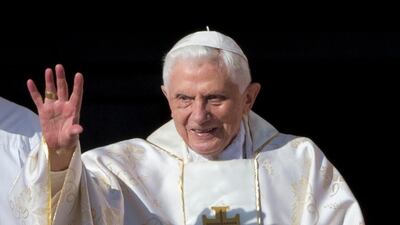Retired Pope Benedict XVI has been criticised after he blamed the “all-out sexual freedom” of the 1960s for clerical abuse scandals within the Catholic Church.
In a 6,000-word essay published in a monthly church magazine in Bavaria, the 91-year-old said the crisis began in the early 1960s when sex began appearing in films and “homosexual cliques” formed in seminaries.
Benedict said the cultural changes led to a general “dissolution” of morality within the church.
"Why did paedophilia reach such proportions? Ultimately, the reason is the absence of God," he wrote in German magazine Klerusblatt.
“It could be said that in the 20 years from 1960 to 1980, the previously normative standards regarding sexuality collapsed entirely, and a new normalcy arose that has by now been the subject of laborious attempts at disruption,” he added.
The former pontiff also attributed the blame to church laws which protected priests accused of sexual abuse.
He said during the 1980s and 1990s that priests were given a right to defence that “was so broad as to make a conviction nearly impossible”.
As a cardinal, Benedict, who became Pope in 2005 following the death of his predecessor John Paul II, was responsible for spearheading reforms in the church which made it easier to defrock priests accused of abusing children.
In 2013, he became the first Pope to resign the papacy since Gregory XII in 1415, citing his advanced age.
At the end of his letter, Benedict thanked his replacement Pope Francis "for everything he does to show us, again and again, the light of God, which has not disappeared, even today".
But some critics have said Benedict’s intervention has undermined the work of his successor, who blames the sexual abuse scandal on a culture in the church which raised priests above their congregations.
Church historian Christopher Bellitto described the comments as “catastrophically irresponsible”.
“It creates a counter-narrative to how Francis is trying to move ahead based on the 2019 [sex abuse] summit. The essay essentially ignores what we learned there," he said.
While Villanova University theologian Massimo Faggioli said the essay was inaccurate because it failed to address cases of sexual abuse in the church which happened long before the 1960s.
"If a pope emeritus decides to stay silent, it's one thing and can be defended. But speaking and telling a tiny part and a very personal version of the story, it's hard to defend," Mr Faggioli said on Twitter.

